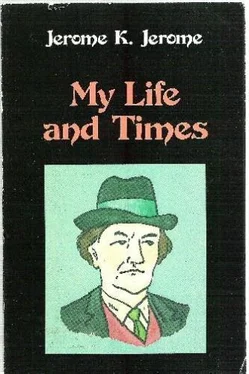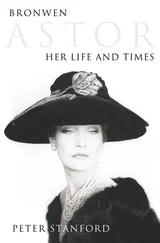There seems to have been a “property” at Notting Hill. On February 2nd, 1870, my mother writes:
“We are enduring a fearful struggle to try and save our property at Notting Hill, the hard-earned savings and privations of years.”
“March 10th. My birthday. How dark! Luther gave me a pencil case, and Blandina a handkerchief. Papa gave me all he had, his love. He has had to give up his situation.”
“March 12th. Saw the Directors. They will take £670 for the Notting Hill property. May God direct me how to raise it. Mr. Griffiths sent a pork pie for Papa. How kind!”
“March 21st. To the city and saw Mr. D. Very weary and sad at heart. Dined with Mr. G. at Wilkinson's à la mode Beef rooms. Very good.”
“April 5th. Mr. N. thinks the mortgage may be effected. Saw Mr. Hobson and the Pelican. Mr. C. would not make an offer. Came home with a sick headache.”
“April 25th. To city. Waited at Mr. M.'s office till quite weary. He never came. Saw Mr. H. He advises me to give it up.”
And then on June 4th my mother writes:
“I will magnify Thee, O Lord, for Thou hast set me up, and not made my foes to triumph over me.”
From which I gather my mother came home that afternoon with a lighter step than for many a long day, giving herself all the airs of a smart business woman, the owner of “property” at Notting Hill.
The Franco-Prussian War broke out that year. All we boys were for Prussia, and “Pro-French” was everywhere a term of opprobrium. The idea that England would, forty and odd years later, be fighting side by side with France against Germany, would then have seemed as impossible, as to some of us nowadays would be the suggestion that fifty years hence, or maybe sooner, Germany may be our ally against France, as she was at Waterloo.
My sister Paulina had married one Robert Shorland, known later on in sporting circles as the father of Frank Shorland, the long-distance bicycle champion; and that autumn we left Poplar and went to live near to her in New Southgate: Colney Hatch as it was then called. It was little more than a country village in those days, with round about it fields and woods. London was four miles off, by way of Wood Green and Hornsey, with its one quaint street and ivy-covered church: and so on till you came to the deer park at Holloway.
I remember a little dog, belonging to my wife. She had had him from a puppy, and all his life he had lived in London. He was friendly with the neighbouring cats, and used to play with a white rabbit, belonging to the children next door. When he was nine years old, we took him with us into the country, and in less than six months he was the worst dog in the village. When he wasn't poaching, or chivying cats up trees, or killing chickens, he was fighting. He died fighting. A red-haired female was at the bottom of it. In London he had never looked at them.
In Poplar, I had been a model boy. There must be the Devil in the country for dogs and boys. I got into a bad set. It included the Wesleyan minister's two sons, and also the only child of the church organist. Religion, as Gibbon observes, would seem to be powerless to control the evil instincts of the human race. We robbed orchards. We snared rabbits in Walker's wood. It stretched from Colney Hatch to Old Southgate. The family consisted of eleven brothers, all enthusiastic cricketers. They formed themselves into a club and became famous. A stream ran through a park on the way to Palmer's Green; and I learnt to tickle trout. We acquired King David's knack of casting stones from a sling. We aimed at birds and cats. Fortunately, we rarely hit them; but were more successful with windows.
There were squatters in those days. One had built himself a shanty where now is Holly Park, a region of respectability; and about it had pegged out some couple of acres. There he had remained undisturbed for years: until a new owner appeared, and the question arose how to get him out. It all depended on a right of way. If he had not that, he could be built round and imprisoned. Then he would be compelled to go. In the middle of the argument, the old man died; and the contest took a new turn. It seemed that where a corpse once passed was ever after a free way to living men: or so it was said. Three stout lads the old man had left behind him, together with two well-grown wenches who could also be useful with their hands, and events promised to be exciting. The landlord had his men waiting day and night to prevent the corpse from passing: while the family within the hut girded their loins, and kept the day and hour of the funeral to themselves. I had it, late one evening, from the son of the butcher, that the attempt was to be made at dawn the next morning; and was up before the sun, making my exit by the window and down the water spout. I was just in time to see the little band of mourners emerge from the cottage. The coffin was borne by the two eldest sons, assisted by a couple of friends. It was only a few hundred yards to the road. But the landlord's men had been forewarned. It was an unholy mêlée . The bearers left the footpath when the landlord's men came towards them, and tried to race to the road through a gap in the hedge a little lower down. But before they could reach it, one of them slipped and fell. The coffin came hurtling down, and around it and over it and all about it a battle royal took place. And while it was still raging, another coffin, carried by the two girls and their two sweethearts, had sprinted down the footpath and gained the road. The first coffin had broken open and was found to be full of stones. How it all ended I don't know. I think there was a compromise. But the party I was sorry for, was the corpse. It was he who had taught me how to tickle trout. He would have loved to be in that last fight.
My father died the following year; on June 3rd, so I learnt from my mother's diary.
“Dear Papa never wore his dressing-gown, for the Lord called him home this morning at half-past nine o'clock. A momentary summons, and he has gone to receive the reward of his labourings and sufferings of so many years.”
He had contracted heart disease and had died stepping out of bed. I have never been able to agree with the Prayer Book. I should always pray myself for sudden death.
My father had never looked old to me. But that may have been because of his jet-black waving hair. It was not till after he was dead that I learnt it was a wig; for in bed, according to the fashion of that period, he always wore a night-cap. One never saw a bald-headed man in those days: men were more particular about their appearance.
I like to think that to my mother, during the last few years of her life, came peace. With the dying of hopes, perhaps went the passing of fears, also. It was a revelation to me, reading her diary. It did not come into my hands until some twenty years later. I had always thought of her as rather a happy lady. I used to hear her singing about her work, even in the grim house at Poplar; and I can remember our rare excursions to the town, to buy me a new suit of clothes or to pay a visit: how we would laugh and joke, and linger before the shop windows, choosing the fine things we would buy when “our ship came home”!
From among her last entries, I quote the following:
“Sept. 17th. My cousin Henry Tucker came to see me. He has grown quite an old man. Blandina came home for the afternoon. A very happy day.”
“July 19th. To Croydon with Blanche. Mr. & Mrs. Clouter very kind. Enjoyed myself.”
“December 4th. Dear Blanche's birthday. Dear Paulina and all the little ones came round and we were all very happy.”
“Christmas Day. Blanche and Luther to Mrs. Marris. Fan & I to Paulina's. Had a pleasant quiet day. The Lord bless my loved ones.”
After my father's death we moved to Finchley. There was a path through the fields to Totteridge, past a thatched cottage where lived a rosy-cheeked little old lady who sold fruit and eggs. She had been a farmer's wife in Devonshire. She and my mother became great chums, and would gossip together on a bench outside the old lady's door.
Читать дальше










